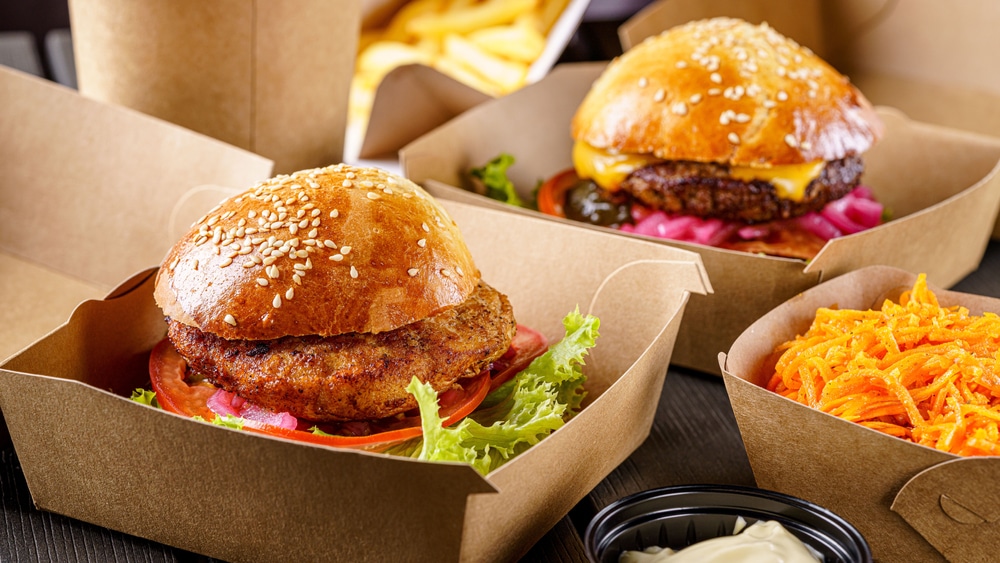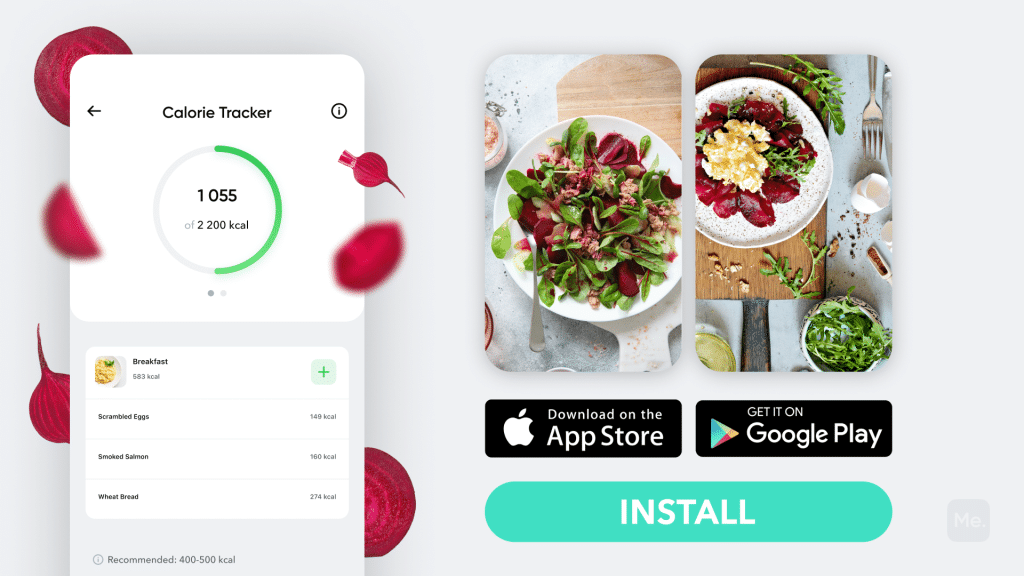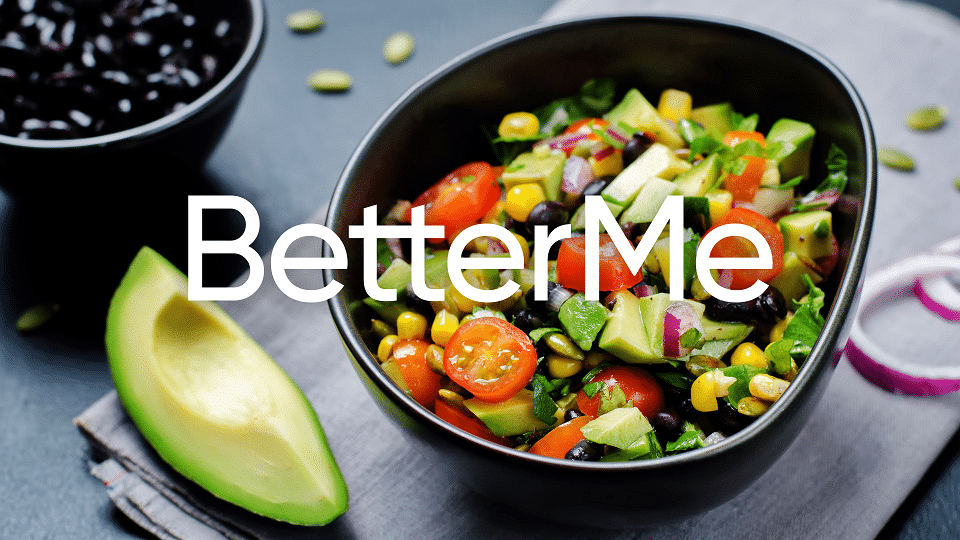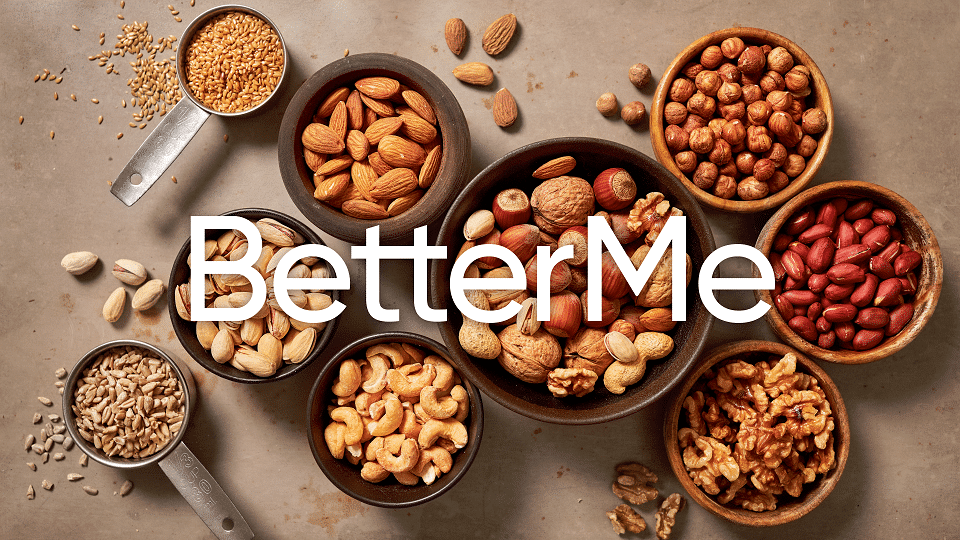People who are underweight may have a fast metabolism or may have difficulty gaining weight due to a medical condition. Unfortunately, being underweight can lead to serious health problems. This can cause problems with fertility, immunity, higher risk of osteoporosis, and more. If you are underweight and want to gain weight, there are certain foods that can help increase your appetite and aid in healthy weight gain.
Get your personalized
meal plan!
Foods That Naturally Increase Appetite
There are certain qualities that appetite-increasing foods tend to have in common. They are often high in calories and carbohydrates, as well as certain vitamins and minerals.
Some trigger the release of hunger-stimulating hormones, while others provide essential nutrients that the body needs to maintain a healthy weight.
For example:
- Fatty fish: Fatty fish like salmon and mackerel are packed with omega-3 fatty acids. These healthy fats may help increase appetite by stimulating the release of hormones that promote hunger (8).
- Sugary and starchy foods: Simple carbohydrates can also be helpful in boosting appetite as they are quickly digested and converted into glucose, which can stimulate the release of hunger-causing hormones (20). They also tend not to make you feel full after eating them, allowing room for more if early satiety is an issue for you. However, too much added sugar isn’t good for your health, so use it in moderation.
- Anything you particularly enjoy: If you don’t have much of an appetite, making an effort to include foods that you especially like or that have special meaning to you can help stimulate psychological or emotional hunger cues.
15 Foods That Help Increase Appetite
Now that you know what qualities to look for in foods that increase appetite, here are 10 specific examples of foods that might help:
Red Pepper Soup With Croutons
Aside from being a warm comfort food, this soup is also packed with hunger-inducing ingredients. There’s no limit to the herbs and spices you can add to this soup.
Carminative herbs and spices are thought to help increase appetite (5). They may work by stimulating the digestive system and promoting the release of bile to facilitate fat digestion. Some carminative herbs and spices to use in your soup include black pepper, coriander, ginger, anise, mint, and cardamom.
Croutons are equally helpful in appetite stimulation, especially if they’re made with white bread. White bread is a simple carbohydrate that is quickly broken down and turned into sugar, which can stimulate the release of hunger hormones (1).
Yogurt Parfait
On its own, yogurt has enough carbohydrates and protein content to help and promote weight gain (11). However, when you add high-carb fruits like bananas and granola, you’ve got yourself a well-rounded meal that will really stimulate your hunger.
The probiotics in yogurt might also help to increase appetite by improving gut health.
Probiotics are live microorganisms that promote a healthy balance of bacteria in the gut. A healthy gut translates to improved digestion and absorption of nutrients, both of which are essential for weight gain (24).
A Charcuterie Board
A charcuterie board is a great way to get a variety of different high-calorie foods in one sitting. It typically includes cured meats, cheeses, nuts, and bread or crackers.
Cured meats are high in protein and fat, both of which are essential for weight gain. They also tend to be quite salty, which can help to stimulate the appetite (14).
Cheese is calorie-dense and protein-rich, which can help you increase your energy and protein intake, promoting weight gain.
Bread and crackers, particularly those made from refined flour, are high in simple carbs that won’t make you feel too full after eating them (15).
A Bowl Of Cereal
A bowl of cereal is a great way to start your day if you’re looking to gain weight.
Most brands have added sugars and other high-calorie ingredients that can help increase appetite. Cereals made with refined grains are also high in simple carbs, which don’t make you feel too full after eating them (20).
Be careful to choose a cereal that is high in calories but also contains some essential nutrients. Look for cereals that are fortified with vitamins and minerals, and make sure to pair them with a source of protein like milk or yogurt.
Chinese Food
Chinese food is typically high in simple carbs and fat, both of which can lead to weight gain (3). If you’re not a fan of Chinese food, go for your favorite cuisine or dish. Eating what you enjoy can help stimulate appetite.
Fruit Smoothies
We know sugar can stimulate the release of hunger hormones, so it makes sense that fruit smoothies would be on this list. The best way to make a filling and satisfying smoothie is to use high-calorie fruits like bananas, mangos, and avocados.
You can also add in some full-fat yogurt or milk to increase the protein and fat content. Just be sure to avoid adding too much fruit juice or added sugar, as it can cause your blood sugar to spike and then lead to an energy crash (19). A little sugar to stimulate your appetite can be helpful, but too much isn’t a good idea.
PB&J Sandwich
Peanut butter and jelly sandwiches are a childhood favorite for a reason. They’re easy to make, filling, and full of calories.
Peanut butter is high in fat and protein, both of which are essential for weight gain. It’s one of the best plant-based foods that increases appetite by supplying the body with the nutrients it needs to build muscle.
Jelly is high in sugar, which can help to stimulate the release of hunger hormones (20). Choose a jelly made with real fruit for an added nutritional boost.
Toast or bread can also help to increase the calorie content of this meal.
Ice Cream
Ice cream is another food that can help to increase appetite by stimulating the release of hunger hormones. It’s high in sugar and fat, both of which are helpful for weight gain (10).
In addition, ice cream is high in calories, making it a great choice if you’re looking to add some extra pounds.
Choose full-fat ice cream for the most calories and nutrients. Avoid brands that use artificial sweeteners.
Granola Bars
Granola bars are a convenient and portable snack that can help you increase your calorie intake. They’re often high in carbohydrates, fat, and calories, making them an excellent choice for those looking to gain weight (23).
Just be sure to read the label before you buy, as some brands are healthier than others. Look for granola bars that are made with whole grains and contain no artificial ingredients.
Whole Milk
Whole milk is a great source of calories, fat, and protein, all of which make it one of the best foods that increase appetite in children. It’s also rich in vitamins and minerals, making it a nutritious choice.
One study found that people who consumed more dairy had increased energy intake overall (6). Choose whole milk over skim or low-fat varieties to get the most benefit.
You can use milk as a base for smoothies, add it to cereal, or simply drink it on its own. If you can’t tolerate lactose, look for a plant-based milk alternative with added protein.
What Are Other Ways To Naturally Increase Appetite?
Diet plays a significant role in appetite, but there are other factors that influence how much you eat. Here are some additional tips to help increase appetite:
Meal Frequency
How often you eat can affect how much you eat. Those who eat more frequent meals are typically able to consume more calories than those who eat fewer, larger meals.
Aim to eat 5-6 small meals throughout the day to increase appetite and calorie intake (22). Include healthy snacks between meals to keep hunger at bay.
Exercise
Exercise can increase appetite by stimulating the release of hunger hormones. It can also help you maintain your muscle mass, or even add some (2).
Aim to get 30 minutes of moderate-intensity exercise most days of the week (17). HIIT and weightlifting are particularly effective at increasing appetite, but they also burn quite a few calories. You’ll need to find the right balance, and talk to your doctor about your plans for exercise, especially if you are trying to gain weight after recovering from an injury or illness.
Stress Management
Chronic stress can lead to a decrease in appetite for some people. This is because stress can interfere with the release of hunger hormones (18).
Try to manage stress through relaxation techniques such as yoga, meditation, and deep breathing. You can also talk to a therapist or counselor to help you cope with stress in a healthy way.
Sleep
Getting enough sleep is essential for overall health and can also help to increase appetite. This is because lack of sleep can interfere with the release of hunger hormones (13).
Aim to get 7-9 hours of quality sleep each night to ensure that you’re getting enough rest (9).
Supplements
There are a few supplements that have been shown to be effective at increasing appetite. These include:
- Omega-3 fatty acids: Found in fish oil, omega-3s may help to increase appetite by stimulating the release of hunger hormones (8).
- Zinc: This mineral is essential for growth and development and might also help to increase appetite (25).
You can get these nutrients from food sources or by taking supplements. Just be sure to talk to your doctor before starting any new supplement, as they can interact with medications you’re taking.
Mealtime Environment
What and where you eat can also affect how much you eat. Try to create a positive and relaxed environment at mealtimes. This may include setting the table, eating with others, and avoiding distractions such as television or work.
You should also make sure that you’re eating foods that you enjoy. Eating foods that you don’t like or that make you feel sick can decrease your appetite.
Food Diary
Keeping a food diary can help with appetite by making you more aware of what you’re eating. This can also guide you to make healthier choices and ensure that you’re getting enough nutrients.
Try to write down everything you eat and drink for 3-5 days. Be sure to include the time of day, portion size, and how you felt before and after eating. This will identify patterns so you can make changes as needed.
The Bottom Line
There are a number of foods that can help increase appetite. These include high-calorie and high-protein foods, as well as those that contain certain nutrients.
You can also boost appetite by eating more frequent meals and exercising regularly. If you’re struggling to increase your appetite, talk to your doctor to rule out any underlying medical conditions.
DISCLAIMER:
This article is intended for general informational purposes only and does not serve to address individual circumstances. It is not a substitute for professional advice or help and should not be relied on for making any kind of decision-making. Any action taken as a direct or indirect result of the information in this article is entirely at your own risk and is your sole responsibility.
BetterMe, its content staff, and its medical advisors accept no responsibility for inaccuracies, errors, misstatements, inconsistencies, or omissions and specifically disclaim any liability, loss or risk, personal, professional or otherwise, which may be incurred as a consequence, directly or indirectly, of the use and/or application of any content.
You should always seek the advice of your physician or other qualified health provider with any questions you may have regarding a medical condition or your specific situation. Never disregard professional medical advice or delay seeking it because of BetterMe content. If you suspect or think you may have a medical emergency, call your doctor.
SOURCES:
- A high carbohydrate, but not fat or protein meal attenuates postprandial ghrelin, PYY and GLP-1 responses in Chinese men (2018, ncbi.nlm.nih.gov)
- Acute and Chronic Effects of Exercise on Appetite, Energy Intake, and Appetite-Related Hormones: The Modulating Effect of Adiposity, Sex, and Habitual Physical Activity (2018, ncbi.nlm.nih.gov)
- Association between Dietary Carbohydrates and Body Weight (2005, ncbi.nlm.nih.gov)
- Dairy products influence gut hormone secretion and appetite differently: A randomized controlled crossover trial (2020, journal of dairy science.org)
- Effect of Herbs and Spices on Metabolic Regulation and Appetite in Healthy Subjects (AFC-SPICES) (2018, clinicaltrials.gov)
- Effect of increased dairy consumption on appetitive ratings and food intake (2007, pubmed.ncbi.nlm.nih.gov)
- Effect of Vitamin D Supplementation on Weight Loss, Glycemic Indices, and Lipid Profile in Obese and Overweight Women: A Clinical Trial Study (2018, ncbi.nlm.nih.gov)
- Fish oil-supplementation increases appetite in healthy adults. A randomized controlled cross-over trial (2013, pubmed.ncbi.nlm.nih.gov)
- How Much Sleep Do We Really Need? (2020, sleepfoundation.org)
- Ice-cream consumption, tendency toward overeating, and personality (2001, researchgate.net)
- Impact of yogurt on appetite control, energy balance, and body composition (2015, academic oup.com)
- Is Spicy Food Good for You? (2021, health clevelandclinic.org)
- Is too little sleep a cause of weight gain? (2019, mayoclinic.org)
- Meats, Processed Meats, Obesity, Weight Gain and Occurrence of Diabetes among Adults (2008, jstor.org)
- Modification of appetite by bread consumption: A systematic review of randomized controlled trials (2017, pubmed.ncbi.nlm.nih.gov)
- Physical activity – it’s important Actions for this page Listen Print Summary Read the full fact sheet (2018, betterhealth.vic.gov)
- Prospective study of nut consumption, long-term weight change, and obesity risk in women (2009, ncbi.nlm.nih.gov)
- Stress and Eating Behaviors (2013, ncbi.nlm.nih.gov)
- Sugar crash effects and how to fix them (2019, sanfordhealth.org)
- The Acute Effects of Simple Sugar Ingestion on Appetite, Gut-Derived Hormone Response, and Metabolic Markers in Men (2017, ncbi.nlm.nih.gov)
- The Benefits of Breakfast Cereal Consumption: A Systematic Review of the Evidence Base (2014, ncbi.nlm.nih.gov)
- The Effect of Eating Frequency on Appetite Control and Food Intake: Brief Synopsis of Controlled Feeding Studies (2011, researchgate.net)
- The efficacy of daily snack replacement with oligofructose-enriched granola bars in overweight and obese adults (2019, cambridge.org)
- What is ‘gut health’ and why is it important? (2019, health.ucdavis.edu)
- Zinc as an appetite stimulator – the possible role of zinc in the progression of diseases such as cachexia and sarcopenia (2019, pubmed.ncbi.nlm.nih.gov)













